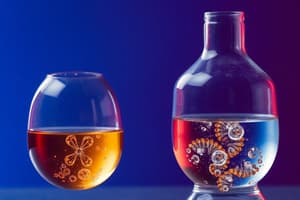Podcast
Questions and Answers
What reaction can phenol undergo with acid chlorides or anhydrides?
What reaction can phenol undergo with acid chlorides or anhydrides?
Esterification
How does the hydroxyl group in phenol react in esterification reactions?
How does the hydroxyl group in phenol react in esterification reactions?
It reacts with the carbonyl group of the acid chloride or anhydride.
What type of mechanism is involved in etherification reactions of phenol with alcohols?
What type of mechanism is involved in etherification reactions of phenol with alcohols?
S_N2 mechanism
What products are formed when phenol undergoes acid-catalyzed reactions with ethers?
What products are formed when phenol undergoes acid-catalyzed reactions with ethers?
Why are etherification reactions of phenol with alcohols more rapid compared to aliphatic alcohols?
Why are etherification reactions of phenol with alcohols more rapid compared to aliphatic alcohols?
What type of reactions are possible between phenol, alcohols, and ethers?
What type of reactions are possible between phenol, alcohols, and ethers?
What makes phenol's electrophilic aromatic substitution (EAS) reactions easier and faster compared to other aromatic compounds?
What makes phenol's electrophilic aromatic substitution (EAS) reactions easier and faster compared to other aromatic compounds?
What type of reactions can occur when electrophiles interact with phenol?
What type of reactions can occur when electrophiles interact with phenol?
How does the hydroxyl group in phenol react under acid-catalyzed conditions?
How does the hydroxyl group in phenol react under acid-catalyzed conditions?
Why is the phenoxonium ion more susceptible to nucleophilic attack compared to the original phenol?
Why is the phenoxonium ion more susceptible to nucleophilic attack compared to the original phenol?
Give an example of a reaction that can occur under acid-catalyzed conditions involving phenol.
Give an example of a reaction that can occur under acid-catalyzed conditions involving phenol.
How does the aromaticity of phenol influence its reactivity in chemical transformations?
How does the aromaticity of phenol influence its reactivity in chemical transformations?
Flashcards are hidden until you start studying
Study Notes
Alcohol, Phenol, and Ether: Exploring Chemical Reactions
In the realm of organic chemistry, alcohols, phenols, and ethers are three fundamental functional groups that play essential roles in various compounds and reactions. Understanding their characteristics and interplay in chemical transformations forms the bedrock of organic chemistry. Let's delve into the reactions of phenols, a unique class of aromatic compounds, and how they interact with alcohols and ethers.
Phenol
Phenol, by definition, is an aromatic hydroxyl compound with a hydroxyl group (OH) attached to a benzene ring. The hydroxyl group in phenol, like in alcohols, can participate in chemical reactions. Phenol's aromaticity imparts unique reactivity, making it distinct from other alcohols.
Reactions of Phenol
-
Aromatic substitution reactions: Phenol's electrophilic aromatic substitution (EAS) is easier and faster than that of other aromatic compounds due to the electron-donating nature of the hydroxyl group. Electrophiles commonly replace the hydroxyl group or other substituents in phenol, transforming it into various functionalized phenols.
-
Acid-catalyzed reactions: Phenol's hydroxyl group can be protonated, forming a positively charged phenoxonium ion. This ion is more electrophilic than the original phenol, making it susceptible to nucleophilic attack. Reactions like Fries rearrangement and the formation of phenol anhydrides are examples of acid-catalyzed phenol chemistry.
-
Esterification: Phenol can undergo esterification with acid chlorides or anhydrides to form aryl esters. In this reaction, the hydroxyl group in phenol reacts with the carbonyl group of the acid chloride or anhydride, forming a new ester bond.
-
Etherification: Phenol can undergo etherification reactions with alcohols, forming arylethers. This reaction is reminiscent of the formation of aliphatic ethers, but it occurs through an S_N2 mechanism due to the electron-donating nature of the hydroxyl group in phenol.
Interactions between Phenol, Alcohols, and Ethers
-
Phenol's reactions with ethers: Phenol can undergo acid-catalyzed reactions with ethers, forming aryl ether anhydrides. This reaction is reversible, and the products can revert to phenol and ether under the appropriate conditions.
-
Phenol's reactions with alcohols: Phenol can undergo etherification reactions with primary and secondary alcohols, forming arylethers. These reactions are more rapid and favorable than the etherification of aliphatic alcohols with aliphatic alcohols due to the electron-donating nature of the hydroxyl group in phenol.
Summary
In summary, phenol, an aromatic hydroxyl compound, can undergo several reactions due to its unique reactivity. Its hydroxyl group can participate in acid-catalyzed reactions, aromatic substitution reactions, esterification, and etherification. Interactions between phenol, alcohols, and ethers are also possible, particularly the formation of arylethers. Understanding these reactions and their mechanisms provides a solid foundation for organic chemists to explore the vast world of phenol derivatives and their applications in synthesis and materials science.
Studying That Suits You
Use AI to generate personalized quizzes and flashcards to suit your learning preferences.




